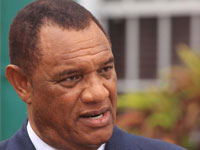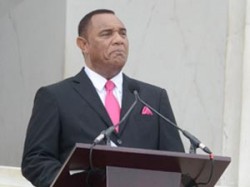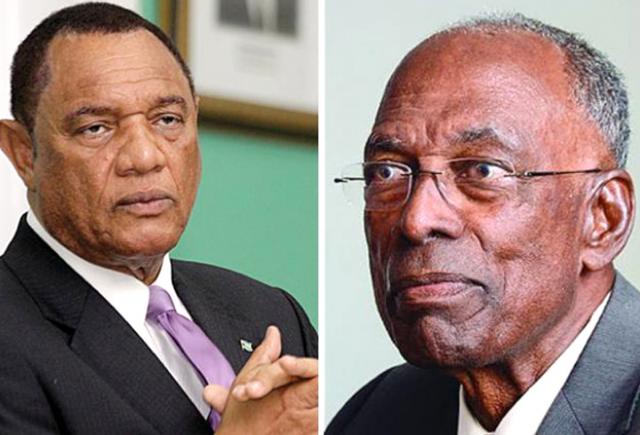 A bill for an act to amend the Constitutional Referendum Act was tabled in the House of Assembly yesterday to introduce special provisions for the holding of referendums of a non-constitutional nature such as the approaching referendum on web shop gaming and a national lottery.
A bill for an act to amend the Constitutional Referendum Act was tabled in the House of Assembly yesterday to introduce special provisions for the holding of referendums of a non-constitutional nature such as the approaching referendum on web shop gaming and a national lottery.
Prime Minister Perry Christie’s communication on the national referendum on gaming got off to a rocky start however, as deputy leader of the Free National Movement (FNM) Loretta Butler-Turner continued to interrupt with shouts of “shameful” and was scolded by House Speaker Dr. Kendal Major for “testing the patience of the chair.”
Christie said title of the act would be changed to the Referendum Act and the bill would further make provisions for the modification of the Parliamentary Elections Act with regard to non-constitutional referendums.
“It will empower the minister to make regulations so as to ensure that the machinery, forms procedures and protocols that apply to elections are adapted to a referendum in a way that is not only appropriate, but consistent with the requirement of fairness, integrity and transparency that we have come to expect in relation to the exercise of the voting franchise,” the Prime Minister said.
He noted that the Government intends for the bill, tabled by Leader of Government Business in the House and Minister of National Security Dr. Bernard J. Nottage, to become law by the end of the year and to be in place for the Referendum on Gaming and a National Lottery that has been pushed back to January 28, 2013.
“I reaffirm that should the referendum produce an affirmative vote, my Government intends to promulgate a regime of stringent regulation on taxation of web shop gaming operations,” he said.
Christie said web shop operators would have to meet internationally-recognized standards.
The Prime Minister said Bahamians have played numbers for years, web shops are licensed under the Business License Act and they have a significant impact on the local economy.
“The web shop employs an estimated 4,000 persons with the potential to employ a lot more once the industry is legalized,” he said.
Christie added that their annual payroll is more than $25 million and they contribute more that $1 million yearly to the National Insurance Board (NIB).
If regularized, he said web shops would pay a cash bond of no less than $1 million per licensee and the annual tax garnered would amount to $15 million to $20 million using conservative figures.
“The previous FNM administration through the Ministry of Finance was well-advanced in the preparation of a regime for the legalization of web shop gaming, indeed they were in close consultation with the web shop operators on the best way forward and had even reached the stage of reviewing legislative models for the legislation of web shop gaming,” Christie said.
“It is important in my view that this historical reality is borne in mind in relation to the public discourse that is now under way so that the public can be assisted in identifying those political figures who are talking out of both sides of their mouths on this issue for reasons that are transparently opportunistic.”
Christie said the Government strongly believes it must act to adopt appropriate and strict anti-money laundering and counter terrorism procedures that are in line with Bahamian law and international standards.
He noted that if web shops continue to operate as they are, The Bahamas is left open to international scrutiny and sanctions for failure to implement anti money laundering rules.
“This position is not acceptable and needs to be addressed without further delay. It has been ignored for too long,” he said.
He noted that the Government must act to close the web shops and regulate them.
Addressing a national lottery, Christie said the most successful lotteries are run by commercial organizations and they must be able to see an appropriate level of return before they commit to an investment.
“The demographics and geography of The Bahamas make the case for a commercial lottery very challenging,” he said.
Christie said close proximity to the U.S. where the jackpot would be larger make it more likely Bahamians would spend their funds on a U.S. lottery. Further, he said the cost to set up infrastructure to properly regulate a national lottery on the family islands would be higher than it would for a population on one island.
“Based on these factors, the advisors initially recommended . . . provisionally that the issue of a national lottery needed more consideration before inclusion in the referendum,” Christie said.
He noted that in the event of a “yes” vote for a lottery, legislation would be put in place and tenders invited from commercial enterprises with the Government keeping the option of operating a national lottery also.
“Such a state-sponsored national lottery might even be based on the principals of widely-held public ownership, such that thousands of ordinary citizens by subscribing for shares through the familiar mechanism of an initial public offering would have a direct equity result in the national lottery,” he said.
Christie noted that the Gaming Board would be the regulator for the enterprises, but the board would need structural changes to ensure it can deliver the licensing objectives.
“My Government pledges to ensure a free and fair national referendum in which the Bahamian electorate will exercise their democratic right to freely vote on the question of web shop gaming and a national lottery. It is for the Bahamian people to decide. My Government will respect, my Government will honor, My Government will abide with the result of the referendum be it yes or be it no,” he said.
After growing controversy surrounding the referendum that was initially slated for December 3, the Prime minister announced at a press conference Tuesday night that the referendum would be pushed back to January 28, 2013, to allow for more public discourse.
By Cleopatra Murphy
Freeport News Reporter



